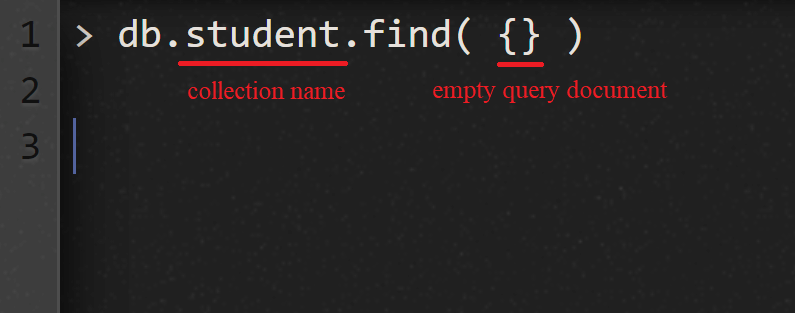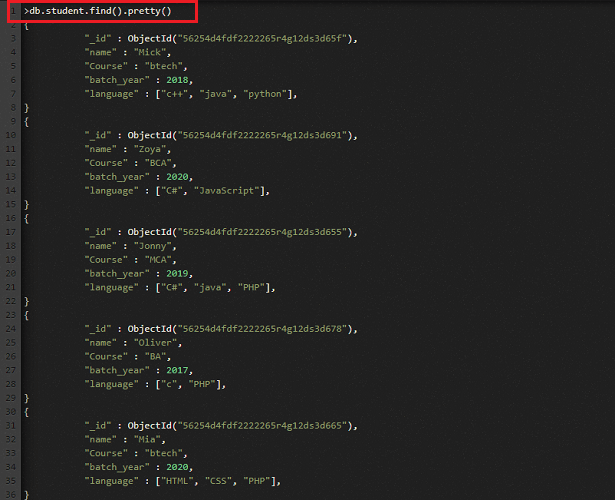MongoDB find() MethodIntroductionIn mongoDB, the find() method is used to fetch a particular data from the table. In other words, it is used to select data in a table. It is also used to return all events to the selected data. The find() method consists of two parameters by which we can find a particular record. Syntax:

Examples:In the following examples, we are working with:
{
"_id" : ObjectId("56254d4fdf2222265r4g12ds3d65f"),
"name" : "Mick",
"Course" : "btech",
"batch_year" : 2018,
"language" : ["c++", "java", "python"],
}
{
"_id" : ObjectId("56254d4fdf2222265r4g12ds3d691"),
"name" : "Zoya",
"Course" : "BCA",
"batch_year" : 2020,
"language" : ["C#", "JavaScript"],
}
{
"_id" : ObjectId("56254d4fdf2222265r4g12ds3d655"),
"name" : "Jonny",
"Course" : "MCA",
"batch_year" : 2019,
"language" : ["C#", "java", "PHP"],
}
{
"_id" : ObjectId("56254d4fdf2222265r4g12ds3d678"),
"name" : "Oliver",
"Course" : "BA",
"batch_year" : 2017,
"language" : ["c", "PHP"],
}
{
"_id" : ObjectId("56254d4fdf2222265r4g12ds3d665"),
"name" : "Mia",
"Course" : "btech",
"batch_year" : 2020,
"language" : ["HTML", "CSS", "PHP"],
}
Example 1: Find all documents in the collection of the student.When we need all the records, we don't use any parameter in the query. Output: 
Example 2: Find Specific DocumentsIn this example, we are only retrieving those student's documents whose student course is btech. Output:
>db.student.find({Course : btech})
{
"_id" : ObjectId("56254d4fdf2222265r4g12ds3d65f"),
"name" : "Mick",
"Course" : "btech",
"batch_year" : 2018,
"language" : ["c++", "java", "python"],
}
{
"_id" : ObjectId("56254d4fdf2222265r4g12ds3d665"),
"name" : "Mia",
"Course" : "btech",
"batch_year" : 2020,
"language" : ["HTML", "CSS", "PHP"],
}
Example 3: Find the embedded documentIn this example, we are only retrieving those students' documents that match the values at the given array. Output:
>db.student.find({score:{HTML, CSS, PHP}})
{
"_id" : ObjectId("56254d4fdf2222265r4g12ds3d665"),
"name" : "Mia",
"Course" : "btech",
"batch_year" : 2020,
"language" : ["HTML", "CSS", "PHP"],
}
Example 4: Display documents with specified fieldsIn this example, we are retrieving only student name fields with the help of projection. Output:
>db.student.find({},{name:1, _id:0})
{ "name" : "Mick" }
{ "name" : "Zoya" }
{ "name" : "Jonny" }
{ "name" : "Oliver" }
{ "name" : "Mia" }
Example 5: Display only two documents using the limit() methodOutput:
>db.student.find().limit(3)
{
"_id" : ObjectId("56254d4fdf2222265r4g12ds3d65f"),
"name" : "Mick",
"Course" : "btech",
"batch_year" : 2018,
"language" : ["c++", "java", "python"],
}
{
"_id" : ObjectId("56254d4fdf2222265r4g12ds3d691"),
"name" : "Zoya",
"Course" : "BCA",
"batch_year" : 2020,
"language" : ["C#", "JavaScript"],
}
{
"_id" : ObjectId("56254d4fdf2222265r4g12ds3d655"),
"name" : "Jonny",
"Course" : "MCA",
"batch_year" : 2019,
"language" : ["C#", "java", "PHP"],
}
Example 6: Find the specific documents with conditional criteriaIn this example, we are only retrieving those students' documents whose batch_year is greater than 2018. Output:
>db.student.find({batch_year : {$gt : 2018}})
{
"_id" : ObjectId("56254d4fdf2222265r4g12ds3d691"),
"name" : "Zoya",
"Course" : "BCA",
"batch_year" : 2020,
"language" : ["C#", "JavaScript"],
}
{
"_id" : ObjectId("56254d4fdf2222265r4g12ds3d655"),
"name" : "Jonny",
"Course" : "MCA",
"batch_year" : 2019,
"language" : ["C#", "java", "PHP"],
}
{
"_id" : ObjectId("56254d4fdf2222265r4g12ds3d665"),
"name" : "Mia",
"Course" : "btech",
"batch_year" : 2020,
"language" : ["HTML", "CSS", "PHP"],
}
Next TopicMongoDB $group operator
|
 For Videos Join Our Youtube Channel: Join Now
For Videos Join Our Youtube Channel: Join Now
Feedback
- Send your Feedback to [email protected]
Help Others, Please Share









